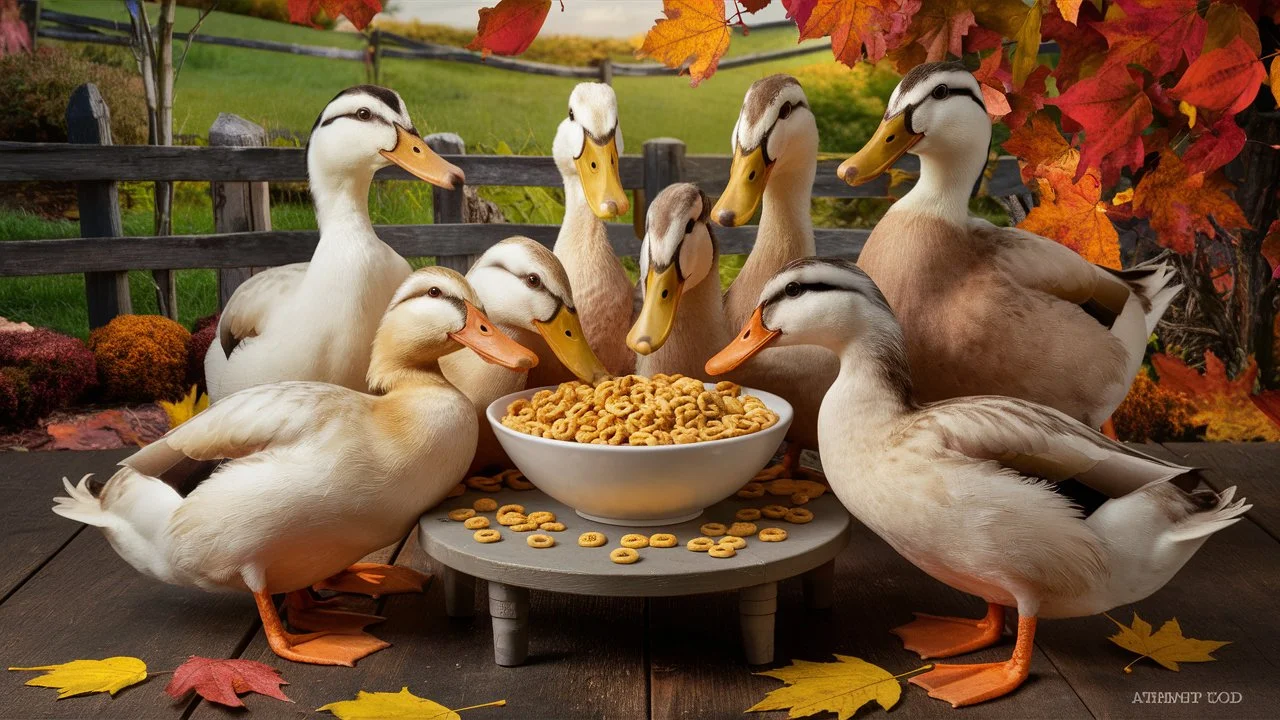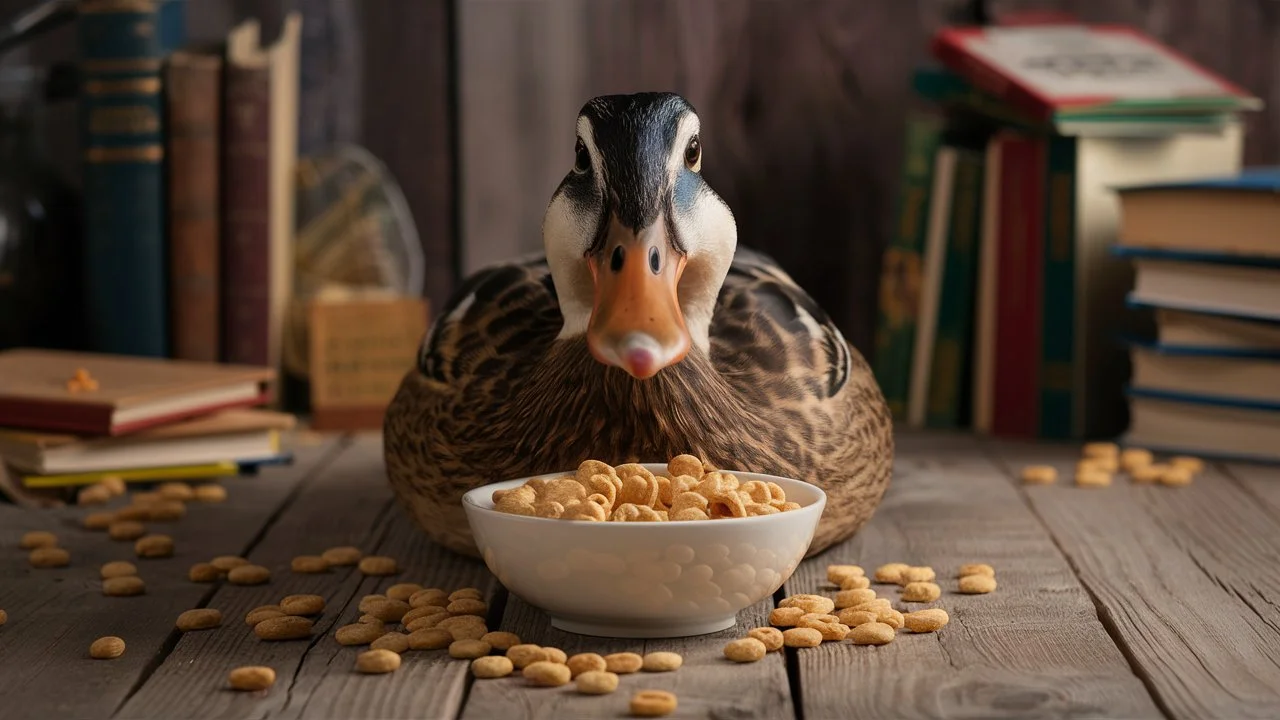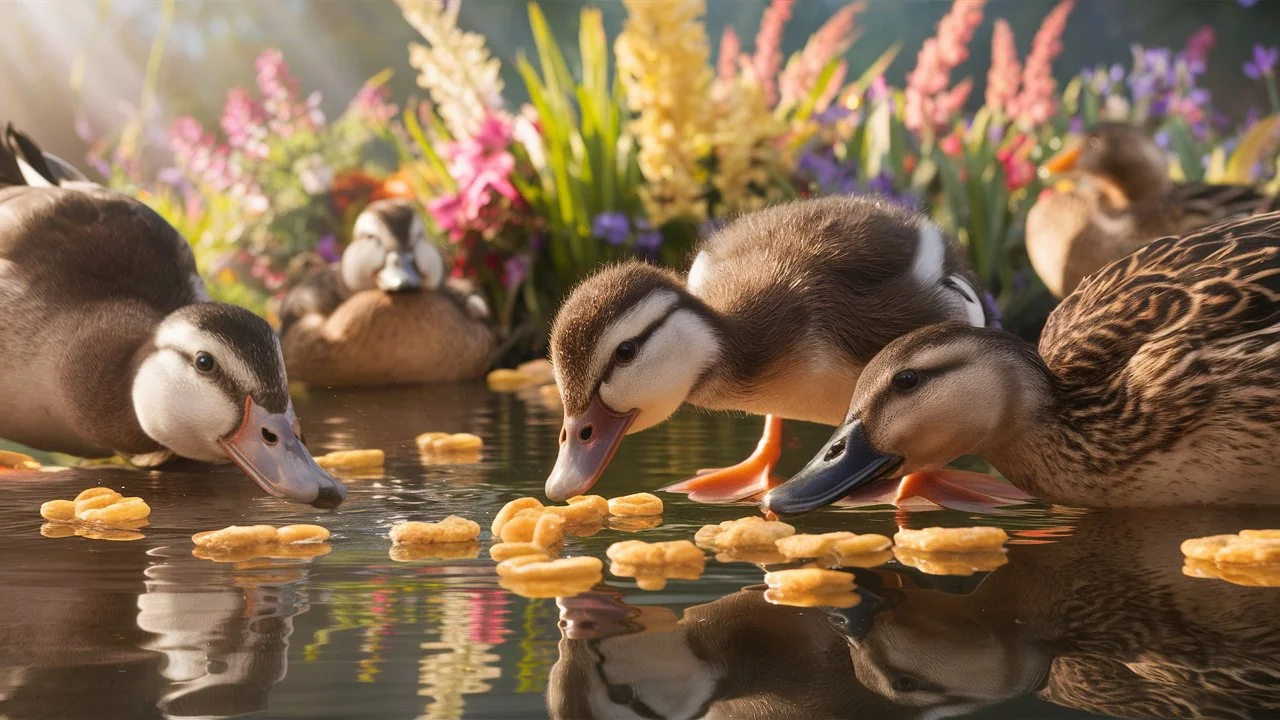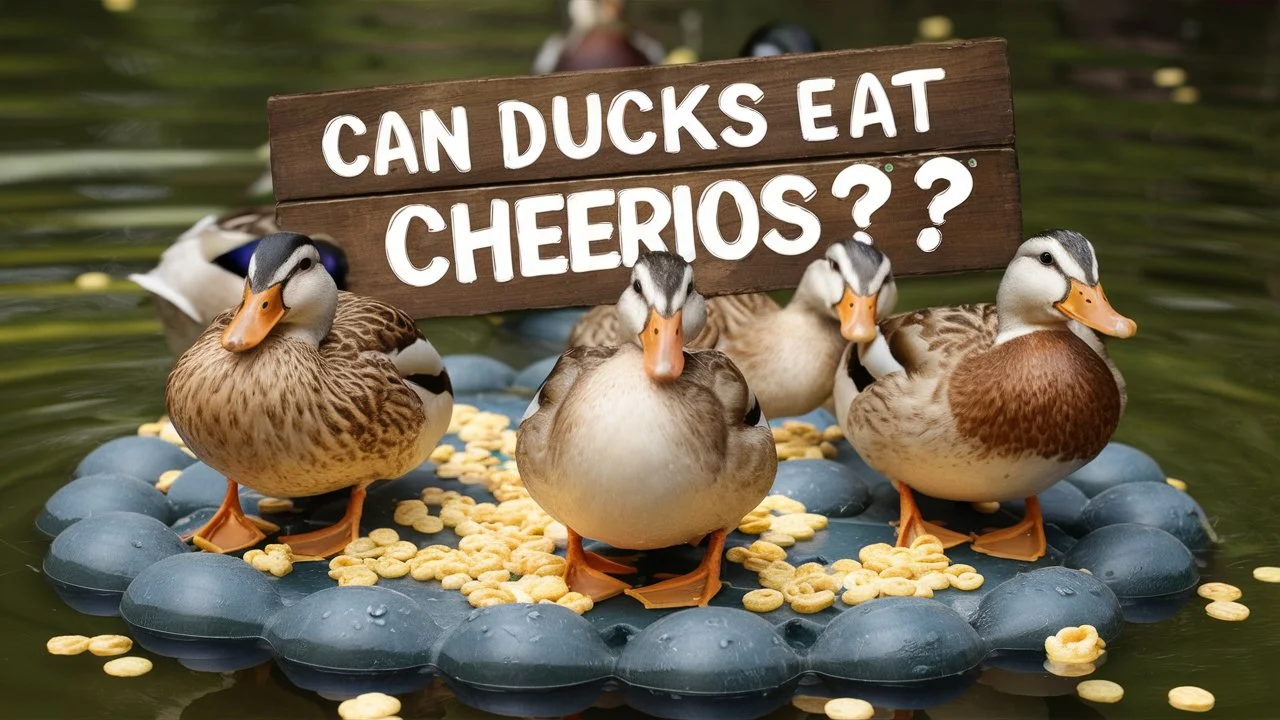Feeding ducks is a fun and relaxing activity. Many people love to share their snacks with these friendly birds. A common question is: “Can ducks eat Cheerios?” It might seem like a harmless treat, but it’s important to know if it’s safe for them. In this simple guide, we will explain if Cheerios are good for ducks and how to give them this snack safely. Keep reading to find out the answer and learn how to keep your ducks happy and healthy
Yes, ducks can eat Cheerios but they should only be given as an occasional treat and in small amounts. It’s best to offer plain Cheerios, soaked in water to make them easier for the ducks to eat and digest. Always ensure that Cheerios do not replace a balanced diet of grains, vegetables, and specially formulated duck feed.
Can Ducks Eat Cheerios?
Ducks are delightful creatures that many people enjoy feeding, whether they encounter them in a park or keep them as pets. It’s common to want to share human food with them, but it’s crucial to ensure that what you’re offering is safe and nutritious. One popular human snack that often comes to mind is Cheerios. This guide will explore whether ducks can eat Cheerios, the nutritional considerations, and best practices for feeding ducks.
Related reading:Do Ducks Eat Celery?

Understanding Duck Nutrition
Before diving into whether ducks can eat Cheerios, it’s important to understand what ducks need in their diet. Ducks are omnivores, meaning they eat a variety of foods. In the wild, their diet typically consists of:
- Grains and Seeds: These provide essential carbohydrates and some protein.
- Aquatic Plants: These offer a range of vitamins and minerals.
- Insects and Small Fish: These are crucial for protein and fats.
- Greens and Vegetables: Ducks also eat a variety of greens that contribute to their overall nutrition.
A balanced diet for a domesticated duck often includes a combination of commercial duck feed, which is specially formulated to meet their nutritional needs, and fresh vegetables, grains, and occasional protein sources like mealworms or fish.
Cheerios: Nutritional Profile
Cheerios are a popular breakfast cereal made primarily from whole grain oats. Here’s a basic nutritional breakdown per 1-cup serving of plain Cheerios:
- Calories: 100
- Protein: 3 grams
- Fat: 2 grams
- Carbohydrates: 20 grams
- Fiber: 3 grams
- Sugars: 1 gram
- Vitamins and Minerals: Cheerios are often fortified with vitamins and minerals such as iron, calcium, and various B vitamins.
While Cheerios are a relatively healthy snack for humans, it’s important to consider how these nutrients translate to a duck’s dietary needs.
Can Ducks Eat Cheerios?
The short answer is yes, ducks can eat Cheerios but there are some important caveats to consider.
Moderation is Key
Cheerios should be given to ducks in moderation. While they are not inherently harmful, they should not constitute a large portion of a duck’s diet. Ducks have specific nutritional requirements that are best met with a balanced diet of grains, greens, and protein sources.
Type of Cheerios
Plain Cheerios are preferable when feeding ducks. Flavored varieties, especially those with high sugar content or artificial additives, should be avoided. For example, Honey Nut Cheerios or Frosted Cheerios contain added sugars and flavorings that are not suitable for ducks.
Preparation
It is a good idea to soak Cheerios in water before offering them to ducks. This makes them easier to eat and digest, especially for younger ducks or ducklings. Dry Cheerios can sometimes be difficult for ducks to swallow and may pose a choking hazard.
Are Cheerios safe for ducks?
Yes, Cheerios can be safe for ducks if given in moderation and with certain precautions. However, they should not be a primary food source. Here’s a detailed guide on the safety and considerations of feeding Cheerios to ducks:

Nutritional Considerations
Cheerios are made from whole grain oats and are often fortified with vitamins and minerals. Here’s a basic nutritional breakdown of plain Cheerios per 1-cup serving:
- Calories: 100
- Protein: 3 grams
- Fat: 2 grams
- Carbohydrates: 20 grams
- Fiber: 3 grams
- Sugars: 1 gram
While Cheerios have some beneficial nutrients, they lack the complete nutrition that ducks need, especially regarding protein and other essential vitamins and minerals.
Feeding Cheerios to Ducks: Best Practices
If you decide to feed Cheerios to ducks, follow these best practices to ensure their health and safety:
1. Offer Small Amounts
Cheerios should be an occasional treat rather than a regular part of the duck’s diet. Offering a small handful once or twice a week is sufficient.
2. Combine with Other Treats
Consider mixing Cheerios with other healthy treats. Ducks enjoy a variety of foods, so combining Cheerios with peas, corn, or chopped greens can make for a more balanced snack.
3. Ensure Fresh Water is Available
Always provide fresh, clean water for ducks to drink while they eat. This helps them digest their food properly and prevents any potential choking hazards.
4. Avoid Overfeeding
Feeding ducks too much human food can lead to nutritional imbalances and health issues such as obesity or malnutrition. Always ensure that their main diet consists of a balanced mix of commercial duck feed and fresh, natural foods.
5. Observe for Any Adverse Reactions
After feeding Cheerios to ducks for the first time, observe them for any adverse reactions such as digestive issues or changes in behavior. If you notice anything unusual, refrain from offering Cheerios in the future and consult with a veterinarian.
Alternative Treats for Baby Ducks
While Cheerios can be a fun treat, there are many other healthy snacks you can offer to ducks. Some suitable options include:
Vegetables and Greens
- Lettuce (avoid iceberg lettuce, which has little nutritional value)
- Spinach
- Kale
- Peas
- Corn (fresh or thawed from frozen)
Fruits
- Blueberries
- Strawberries
- Apples (remove seeds)
- Bananas
Grains
- Cooked Rice (avoid seasoning or additives)
- Oats (plain, uncooked)
- Barley
Protein Sources
- Mealworms
- Crickets
- Small Fish (such as minnows)
Commercial Duck Feed
High-quality commercial duck feed should form the basis of a domestic duck’s diet. These feeds are specially formulated to meet the nutritional needs of ducks at different life stages.
What to Avoid Feeding Ducks
Just as there are suitable treats for ducks, there are also foods that should be avoided. These include:
- Bread: Bread offers little nutritional value and can lead to malnutrition and obesity in ducks.
- Processed Foods: Foods high in salt, sugar, or artificial additives can be harmful to ducks.
- Avocado: Contains persin, which is toxic to ducks.
- Chocolate: Contains theobromine, which is toxic to many animals, including ducks.
- Onions and Garlic: Can cause digestive issues and toxicity in ducks.
Can baby ducks eat cheerios?
Yes, baby ducks can eat Cheerios, but there are important considerations to ensure their health and safety. Here’s a detailed guide on feeding Cheerios to baby ducks:

Nutritional Needs of Baby Ducks
Before diving into the specifics of Cheerios, it’s crucial to understand the dietary requirements of baby ducks. They need a diet rich in:
- Protein: Essential for growth and development.
- Vitamins and Minerals: Necessary for overall health and development.
- Fats: Needed in small amounts for energy.
- Carbohydrates: Provide energy for active baby ducks.
Commercial starter feed formulated specifically for ducklings is the best way to meet these needs. It provides the right balance of nutrients for their early growth stages.
Cheerios: Are They Safe for Baby Ducks?
Nutritional Content of Cheerios
Cheerios are made from whole grain oats and are often fortified with vitamins and minerals. Here’s what you find in a 1-cup serving of plain Cheerios:
- Calories: 100
- Protein: 3 grams
- Fat: 2 grams
- Carbohydrates: 20 grams
- Fiber: 3 grams
- Sugars: 1 gram
While Cheerios do contain some beneficial nutrients, they are not a balanced diet for baby ducks. They lack the necessary protein and other essential nutrients found in commercial duckling feed.
Moderation and Type
- Moderation: Cheerios should be an occasional treat rather than a regular part of a duckling’s diet.
- Type: Only plain Cheerios should be given. Flavored varieties contain added sugars and artificial ingredients that are not suitable for baby ducks.
How to Feed Cheerios to Baby Ducks?
Preparation
- Soak in Water: Soak Cheerios in water to soften them. This makes them easier for baby ducks to eat and digest, reducing the risk of choking.
Feeding Tips
- Small Amounts: Offer a small amount of soaked Cheerios, mixing them with their regular feed.
- Mix with Other Foods: Combine Cheerios with other nutritious treats like chopped greens or small pieces of vegetables.
Monitor Health
Observe the ducklings after introducing Cheerios for any signs of digestive issues or changes in behavior. If any adverse reactions occur, stop feeding them Cheerios and consult a veterinarian.
Alternative Treats for Baby Ducks
While Cheerios can be an occasional treat, there are many other healthy options to consider:
Vegetables and Greens
- Lettuce (avoid iceberg)
- Spinach
- Kale
- Peas
Fruits
- Blueberries
- Strawberries (in small amounts)
Protein Sources
- Boiled Eggs (mashed)
- Mealworms (in moderation)
Grains
- Oats (plain, uncooked)
- Cooked Rice (plain)
Commercial Starter Feed
A high-quality commercial starter feed should be the main component of a duckling’s diet. These feeds are specially formulated to meet the nutritional needs of growing ducks.
What to Avoid Feeding Baby Ducks?
- Bread: Offers little nutritional value and can cause health issues.
- Sugary or Processed Foods: High sugar content and artificial additives can be harmful.
- Avocado: Contains persin, which is toxic to ducks.
- Onions and Garlic: Can cause digestive issues and toxicity.
- Chocolate: Contains theobromine, which is toxic to ducks.
Conclusion
Feeding Cheerios to ducks can be a fun and rewarding activity, but it’s important to do so responsibly. Cheerios should be given in moderation, preferably plain and soaked in water. Always prioritize a balanced diet that meets the nutritional needs of ducks, incorporating a mix of grains, vegetables, and protein sources. By following these guidelines, you can ensure that the ducks you feed remain healthy and happy.
In summary, while ducks can enjoy Cheerios as an occasional treat, their overall diet should be carefully managed to maintain their health and well-being. Always provide a variety of nutritious foods and avoid harmful substances to ensure that your feathered friends thrive.

